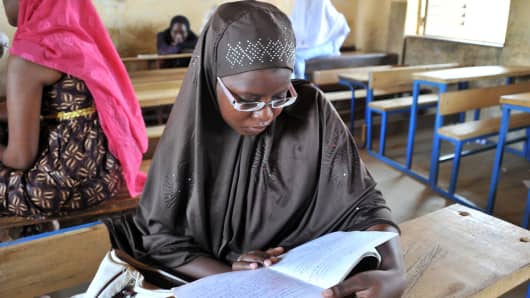Expanding economic participation is one of the most effective tools we have to strengthen the economy and create jobs. So why do we continue to leave out women, half of the world's population? By empowering women economically — harnessing this untapped resource and growing the global economy — everyone benefits. But first, we have to educate them. As the saying goes: If you educate a man, you educate a person, but if you educate a woman, you educate a whole nation.
As we've seen here in America, when women are given access to education, they soar. While we continue the fight to empower women economically here in the U.S. — through equal pay and other measures — we also recognize how far we've come, with women making up 57 percent of the workforce, 60 percent of our college graduates and 70 percent of our high school valedictorians.
But in the developing world, the fight is just beginning.
Read More Nobel Peace Prize goes to Malala Yousafzai and Kailash Satyarthi
Today, over 30 million girls don't attend secondary school, 80 percent of whom live in Sub-Saharan and West Africa. In these areas, the barriers preventing girls from getting an education seem insurmountable. Girls are discouraged, if not forbidden, from attending school, and for those who can attend, the quality of education is low and the safety risks are high.
We realized just how high the risks were when 300 Nigerian girls were kidnapped by the terrorist organization Boko Haram recently. The tragedy received international attention. Using the hashtag #BringBackOurGirls, millions of people expressed their support for the kidnapped girls and encouraged their safe return.
The benefits to societies of educating girls are well-documented and include lower birth rates, better health, lower infant mortality, fewer teenage marriages and pregnancies, and greater economic well being not only for women, but for the entire community in which they live.
Read MoreMicrosoft CEO apologizes for comments to women on pay gap
Boko Haram translates to "Western Education is Forbidden" and serves as a reminder of the barriers preventing girls in the developing world from getting an education, becoming economically empowered, reaching their full potential, and strengthening the economy for us all. And it has spurred some to take action to break down those barriers.
Last month, at the 10th annual Clinton Global Initiative meeting, Hillary Clinton announced a $600 million effort called CHARGE, which will help 14 million disadvantaged girls throughout the world attend secondary school. CHARGE – the Collaborative for Harnessing Ambition and Resources for Girls' Education – will work to break down the barriers that are preventing girls in the developing world from completing secondary education.
Read More'I am a science geek!': 'Big Bang Theory' actress
CHARGE was developed with five main goals in mind: To keep girls in school, ensure schools are safe, improve the quality of learning for girls, support transitions into and out of school, and to support girls' education leaders and workers in developing countries to fulfill these goals.
When making the announcement, Hillary Clinton said, "We know that when girls have equal access to education in both primary and secondary schools, cycles of poverty are broken, economies grow, glass ceilings crack, and potential is unleashed."
Read MoreSarah Silverman: Can I get $30T, please?
Let's educate our girls. Let's unleash their potential. Let's strengthen the economy. And of course, let's bring back our girls.
Commentary by Shelly Porges, the national finance co-chair for Ready for Hillary PAC. She was also the former senior advisor to the Global Entrepreneurship Program at the U.S. State Department, and launched the State Department's Global Women's Business Initiative. Follow her on Twitter @shellyporges.


